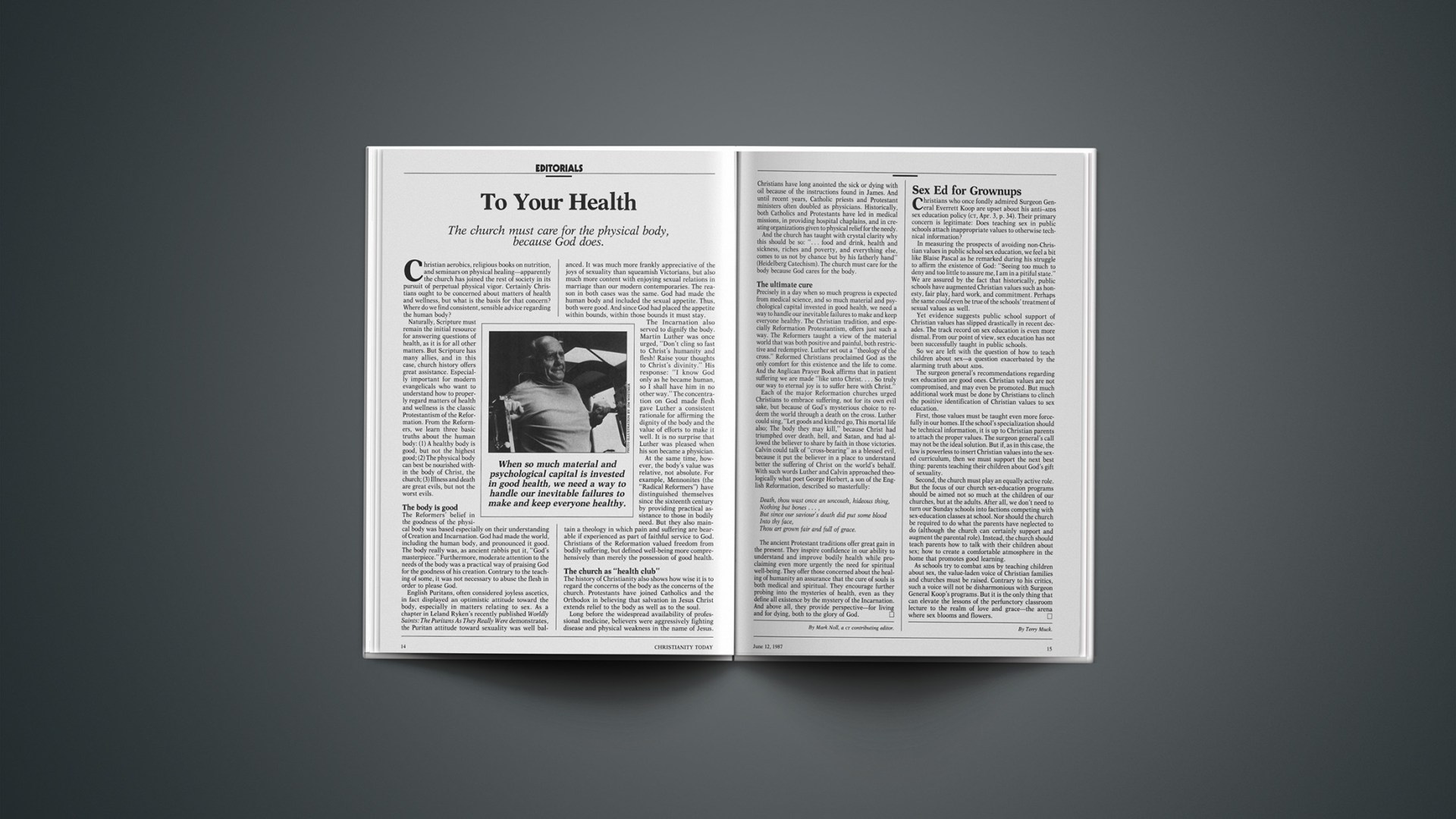Christian aerobics, religious books on nutrition, and seminars on physical healing—apparently the church has joined the rest of society in its pursuit of perpetual physical vigor. Certainly Christians ought to be concerned about matters of health and wellness, but what is the basis for that concern? Where do we find consistent, sensible advice regarding the human body?
Naturally, Scripture must remain the initial resource for answering questions of health, as it is for all other matters. But Scripture has many allies, and in this case, church history offers great assistance. Especially important for modern evangelicals who want to understand how to properly regard matters of health and wellness is the classic Protestantism of the Reformation. From the Reformers, we learn three basic truths about the human body: (1) A healthy body is good, but not the highest good; (2) The physical body can best be nourished within the body of Christ, the church; (3) Illness and death are great evils, but not the worst evils.
The Body Is Good
The Reformers’ belief in the goodness of the physical body was based especially on their understanding of Creation and Incarnation. God had made the world, including the human body, and pronounced it good. The body really was, as ancient rabbis put it, “God’s masterpiece.” Furthermore, moderate attention to the needs of the body was a practical way of praising God for the goodness of his creation. Contrary to the teaching of some, it was not necessary to abuse the flesh in order to please God.
English Puritans, often considered joyless ascetics, in fact displayed an optimistic attitude toward the body, especially in matters relating to sex. As a chapter in Leland Ryken’s recently published Worldly Saints: The Puritans As They Really Were demonstrates, the Puritan attitude toward sexuality was well balanced. It was much more frankly appreciative of the joys of sexuality than squeamish Victorians, but also much more content with enjoying sexual relations in marriage than our modern contemporaries. The reason in both cases was the same. God had made the human body and included the sexual appetite. Thus, both were good. And since God had placed the appetite within bounds, within those bounds it must stay.
The Incarnation also served to dignify the body. Martin Luther was once urged, “Don’t cling so fast to Christ’s humanity and flesh! Raise your thoughts to Christ’s divinity.” His response: “I know God only as he became human, so I shall have him in no other way.” The concentration on God made flesh gave Luther a consistent rationale for affirming the dignity of the body and the value of efforts to make it well. It is no surprise that Luther was pleased when his son became a physician.
At the same time, however, the body’s value was relative, not absolute. For example, Mennonites (the “Radical Reformers”) have distinguished themselves since the sixteenth century by providing practical assistance to those in bodily need. But they also maintain a theology in which pain and suffering are bearable if experienced as part of faithful service to God. Christians of the Reformation valued freedom from bodily suffering, but defined well-being more comprehensively than merely the possession of good health.
The Church As “Health Club”
The history of Christianity also shows how wise it is to regard the concerns of the body as the concerns of the church. Protestants have joined Catholics and the Orthodox in believing that salvation in Jesus Christ extends relief to the body as well as to the soul.
Long before the widespread availability of professional medicine, believers were aggressively fighting disease and physical weakness in the name of Jesus. Christians have long anointed the sick or dying with oil because of the instructions found in James. And until recent years, Catholic priests and Protestant ministers often doubled as physicians. Historically, both Catholics and Protestants have led in medical missions, in providing hospital chaplains, and in creating organizations given to physical relief for the needy.
And the church has taught with crystal clarity why this should be so: “… food and drink, health and sickness, riches and poverty, and everything else, comes to us not by chance but by his fatherly hand” (Heidelberg Catechism). The church must care for the body because God cares for the body.
The Ultimate Cure
Precisely in a day when so much progress is expected from medical science, and so much material and psychological capital invested in good health, we need a way to handle our inevitable failures to make and keep everyone healthy. The Christian tradition, and especially Reformation Protestantism, offers just such a way. The Reformers taught a view of the material world that was both positive and painful, both restrictive and redemptive. Luther set out a “theology of the cross.” Reformed Christians proclaimed God as the only comfort for this existence and the life to come. And the Anglican Prayer Book affirms that in patient suffering we are made “like unto Christ.… So truly our way to eternal joy is to suffer here with Christ.”
Each of the major Reformation churches urged Christians to embrace suffering, not for its own evil sake, but because of God’s mysterious choice to redeem the world through a death on the cross. Luther could sing, “Let goods and kindred go, This mortal life also; The body they may kill,” because Christ had triumphed over death, hell, and Satan, and had allowed the believer to share by faith in those victories. Calvin could talk of “cross-bearing” as a blessed evil, because it put the believer in a place to understand better the suffering of Christ on the world’s behalf. With such words Luther and Calvin approached theologically what poet George Herbert, a son of the English Reformation, described so masterfully:
Death, thou wast once an uncouth, hideous thing,
Nothing but bones …,
But since our saviour’s death did put some blood
Into thy face,
Thou art grown fair and full of grace.
The ancient Protestant traditions offer great gain in the present. They inspire confidence in our ability to understand and improve bodily health while proclaiming even more urgently the need for spiritual well-being. They offer those concerned about the healing of humanity an assurance that the cure of souls is both medical and spiritual. They encourage further probing into the mysteries of health, even as they define all existence by the mystery of the Incarnation. And above all, they provide perspective—for living and for dying, both to the glory of God.
By Mark Noll, a cr contributing editor.









